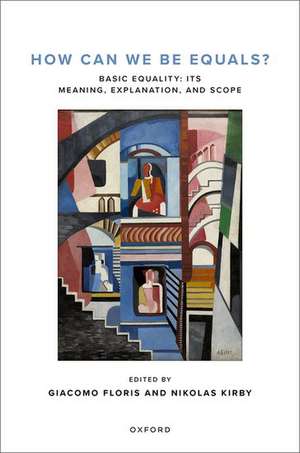How Can We Be Equals?
Editat de Giacomo Floris, Nikolas Kirbyen Limba Engleză Hardback – 23 mai 2024
Preț: 542.84 lei
Preț vechi: 775.45 lei
-30% Nou
Puncte Express: 814
Preț estimativ în valută:
103.88€ • 107.80$ • 86.83£
103.88€ • 107.80$ • 86.83£
Carte disponibilă
Livrare economică 14-20 februarie
Preluare comenzi: 021 569.72.76
Specificații
ISBN-13: 9780192871480
ISBN-10: 019287148X
Pagini: 368
Dimensiuni: 160 x 240 x 23 mm
Greutate: 0.68 kg
Editura: OUP OXFORD
Colecția OUP Oxford
Locul publicării:Oxford, United Kingdom
ISBN-10: 019287148X
Pagini: 368
Dimensiuni: 160 x 240 x 23 mm
Greutate: 0.68 kg
Editura: OUP OXFORD
Colecția OUP Oxford
Locul publicării:Oxford, United Kingdom
Notă biografică
Giacomo Floris is British Academy Fellow in Philosophy at the University of York. His main areas of research are in contemporary moral and political philosophy, with a particular interest in theories of moral status and basic equality, and theories of relational equality and distributive justice. His work has appeared in various journals, including Philosophical Studies, Journal of Ethics, European Journal of Political Theory, and Ethical Theory and Moral Practice.Nikolas Kirby is Lecturer in Politics at the University of Glasgow. Previously, he was Leverhulme Early Career Research Fellow, Departmental Lecturer in Philosophy and Public Policy, and Director of the Building Integrity Programme, Blavatnik School of Government, Oxford University. He was also a Democracy Visiting Fellow at the Kennedy School of Government, Harvard University.
